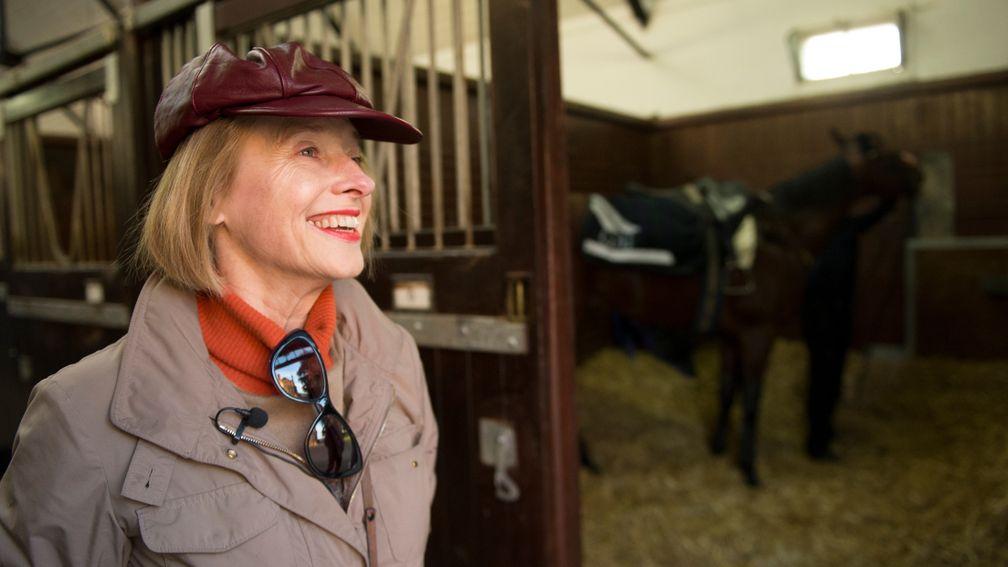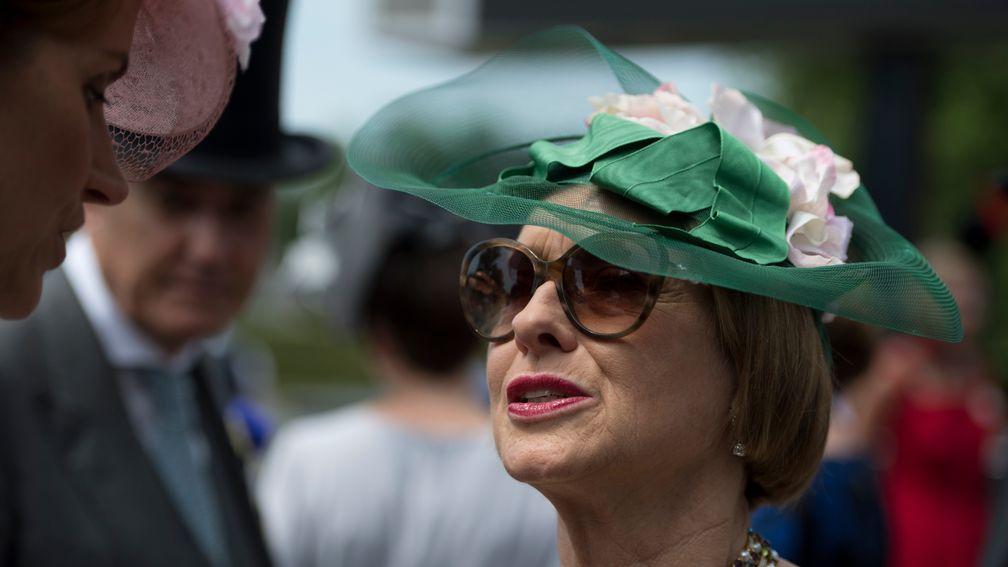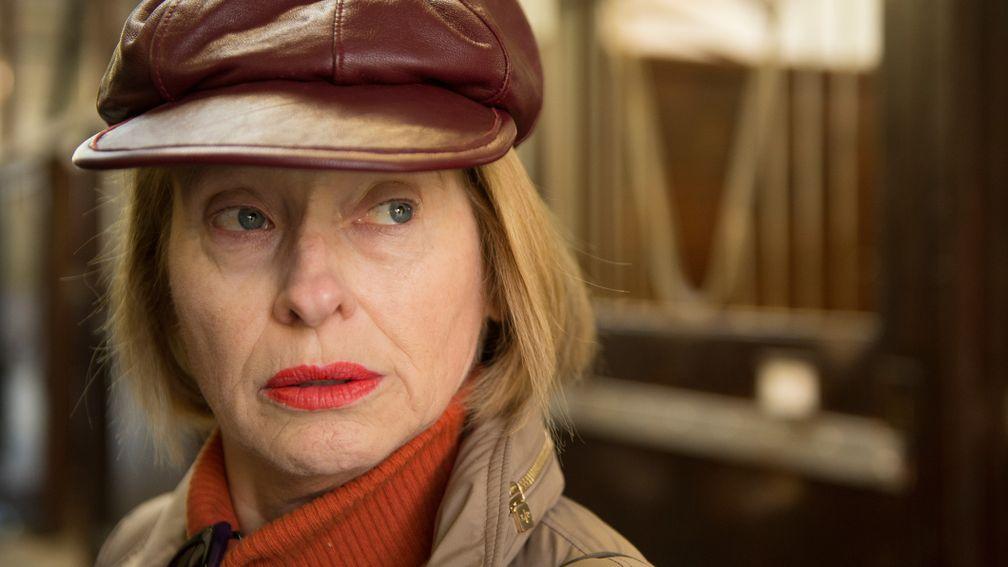'I say it as it is' - a fascinating interview with the mighty Gai Waterhouse
Lee Mottershead meets the trainer who has made it to the top in a man's world

Published in the Racing Post on November 4, 2013
Just as she had promised, Gai Waterhouse turns up at the appointed hour, which is a very early hour indeed. It is 4.45am and Flemington racecourse is covered in darkness save for the red lights that work-riders have fixed on their helmets. Horses go round and round, some of them belonging to a national institution, a member of Australian sporting royalty who scuttles towards the middle of three viewing towers in the middle of the track. She has remembered my name, she greets me and we begin.
During our first meeting at Moonee Valley five mornings earlier, Waterhouse had agreed to be interviewed. "We'll do what I call a walk and talk," she says. This is encouraging, because a lady as famous in her land as the legendary Bart Cummings can most certainly talk. The problem is she walks a lot as well, which makes securing proper interviews with her a shade difficult.
Fortunately she has horses to watch, and in between studying what she sees through binoculars, there is time aplenty to natter.
To condense the sparely made 59-year-old's life into a paragraph is nigh on impossible. Her fame in Australia is vast. Everyone knows her name. It helps that she is the daughter of a training colossus, Tommy Smith, but it also helps that she married into the Waterhouse family, a bookmaking clan associated with considerable scandal over the years. Her husband, Robbie, was a warned-off individual when she fought through the early 1990s to get a training licence of her own. She won that battle and, in the eyes of some, has cleansed a tarnished brand.
She has done so by being friendly, extroverted, glamorous and hugely successful. Her record is overflowing with Group 1 victories, and although a Melbourne Cup is missing, that could change tomorrow when she saddles favourite Fiorente and another fancied European import Tres Blue. Her face adorns billboards across the city, she once appeared in Doctor Who and right now she is giving me a home-packed bag of dried fruit and nuts.
"They're what I call my bags of loaves and fishes," she says from the top of the green tower. "I get up at 2.30am every morning and one of my first jobs is to make up these bags for the boys and girls riding my horses in the mornings. It's very early in the day and the nuts give them a little energy boost."
Waterhouse goes up and down the tower's stairs as we speak, passing on both instructions and nuts to the riders of her select Melbourne team. "I think you can go two on the Pro-Ride but steady Eddie," she says to a young guy called Adam, while her star pupil, a Northamptonshire man named Ed, is told his mount looks "a bit shuffly". Waterhouse knows what she is looking at. During the 2012-13 season her horses won more than $14 million, a good chunk of it coming when Overreach gave her a fifth win in the Golden Slipper, whose £1.3m first prize makes it the world's most valuable juvenile race. Only her late father, with six victories, has won it more.
Yet this has also been a difficult year for Waterhouse. Long-time owner John Singleton publicly sacked her after claiming the trainer's high-profile bookmaker son, Tom, had told friends his star mare More Joyous had suffered a setback and could not win a Group 1 race she was contesting at Randwick in late April. A huge public spat ensued, in which Waterhouse, found innocent of all the most serious charges, accused Singleton of having been drunk on the day of the race. Waterhouse, famously resilient, gives as good as she gets.
"You become very thick-skinned in this business," she says, adding that "Mr Singleton has left my life". Other owners most definitely have not, her client base including no less than the Queen, whose Carlton House was moved to Waterhouse's main Tulloch Lodge yard in Sydney from Sir Michael Stoute, also the original trainer of Fiorente, a close second in last year's Melbourne Cup and most recently third in the Cox Plate. Like so many Australian trainers, she is relying on imports in pursuit of her country's greatest sporting prize.
"We used to be very resentful but now we've come to the opinion that if you can't beat them you have to join them," she says.
"We looked at 30 horses in France last year but I didn't like anything I saw. Then we got to Newmarket's July meeting and I was struck by how good Fiorente looked. He was athletic and raced on the speed, which is what you need here. This year a horse like Fiorente would have cost us $2 million. It was easier two years ago when the dollar was strong but the price of the horses has also gone up because one way the English can earn a dollar is by resale.

"It's a very sad thing. The prize-money in Britain is disgraceful and the people responsible should be kicked in the pants. It's made racing in Britain a sport of the very rich, which is wrong.
"We train them differently here as well, but there's no point saying we're better than you or you're better than us. It's just different. I do think in Britain you put horses in boxes too much, figuratively and literally.
"When they first arrive here they always have poor feet because they've been in boxes too long. The trainers haven't been letting the blood flow to the hooves. Horses also put weight on in Australia because we feed them more. Something else we do that you don't is we regularly spell horses, by which I mean we give them breaks through the year.
"I also bleed mine quite a lot. We make an incision in the jugular and let the blood flow into bags. It causes a massive jolt in the horse's system and within 48 hours you see a big difference. Anyone reading this article who has given blood will know how it leaves you feeling rejuvenated."
People listen to Waterhouse because her record speaks for itself. "I've got to concentrate now," she tells me as she watches Fiorente travel down the back straight of the course on which he will pursue immortality tomorrow. The work over, Waterhouse puts on the scarf she had taken off a few minutes earlier. "I go from being too hot to too cold," she says. "It's like being in London. You must always come with a coat to Melbourne."
Success in Melbourne has not come to her as it has in Sydney, yet she is plainly happier in the former than the latter. Nor has she travelled her horses with any great regularity, her only Royal Ascot mission having ended disastrously when Bentley Biscuit finished last in the 2007 King's Stand Stakes. Next year, however, she could change her ways and bring a small team to Britain. This would be good news as Waterhouse knows a good horse when she sees one.
"I see 2,000 yearlings a year," she says. "It's a lot of work but I enjoy it. When I'm inspecting them I look for the athlete, not at the catalogue page. The page will only tell me how much I have to pay. It's as simple as a guy looking at a girl. If she is drop-dead gorgeous he doesn't want to know about her pedigree, he just wants to be in bed with her. When I see a horse like that he drives me crazy. Of course we make mistakes, but I think we make less mistakes than other people.
"I have a very similar approach to Richard Hannon. I'm very good at buying horses under the odds before turning them into champion stallions. Like Richard, I do it with my own money and shoot from the hip. I'm one of the old cowboys. I spend $8 million at the sales, although, as you can imagine, I sell them on very quickly."
Among those she bought and sold is a two-year-old being dispatched for morning exercise. "Just hold him together and then squeeze him at the two," she tells Adam. Waterhouse learned from her father, but after returning from a spell as an actress in London, she found that while her father wanted her to work in training, he did not want her to train.
"Dad was adamant I'd never make a dollar working as an actress," she says. "He told me to come and work with him in the business. My Uncle Dick had just died so there was an opportunity, but my father's other brother, Uncle Ernie, very much resented me coming on board. I fought Uncle Ernie for about ten years and then I had to fight the establishment for two years when I wanted a licence of my own. That was terrible. I had been trained by the best in the land but my husband was disqualified so they told me I couldn't have a licence."

After two and a half years of fighting officialdom she won, securing a victory for Australian women and causing the introduction of the Waterhouse Act, which affirmed a woman's spouse should not be a factor in her seeking a job. It was not, however, only officials and Uncle Ernie she was up against.
"The whole thing was terribly draining and it caused an absolute rift with my father because he was totally against what I was doing," she says.
"He didn't want me to train and he didn't want me to fight the establishment, which was ironic as Dad came from the wrong side of the track as a boy so he certainly wasn't an establishment figure himself. He said it would be too hard for a woman in Australia. He wanted me to stay as his assistant, but I couldn't do that because I needed the challenge.
"Being a woman in Australia was a big drawback then and it still is today. There is a glass ceiling and I've been lucky enough to break through it, but it's a bloody hard thing to do. When the convicts came across it was a totally male environment. The women came out as prostitutes and second-grade citizens. That ethos has carried on. It's only my opinion but I'm sure it's true."
Waterhouse is anything but a second-grade citizen in Australia. When she goes racing television cameras follow her, just as the eyes of racegoers are hooked on her movements. As ever, she will be the centre of attention tomorrow, dressed in a fabulous hat and with lips a glossy red. She will be the punters' choice and the public's choice.
"People here want me to win the Melbourne Cup," she agrees. "I think it's because I'm very recognisable and I've achieved things in a man's world. I could have easily failed but I'm hard-working, purposeful and say it as it is, which some people don't like. I'm also one of the few people in the world known by their first name. I'm the face of Australian racing and I like that. I also like the fact I can ring the prime minister and he will take my call.
"It can be quite tiresome always being photographed but I want to fly racing's banner. I want to promote the sport the best I can, but I'm at a crossroads in my life and over the next year I need to decide what I want to do.
"I need to decide how I want to run my life for the next 20 years. I want to do things a bit differently but I haven't quite formulated it in my mind."
Yet she says she has a very good idea in that mind how she will feel if Fiorente or Tres Blue gallop to glory in an iconic contest more treasured in its homeland than any race anywhere in the world.
"If I do win the Cup it would get the monkey off my back," she says. "Most of the horses I've run in it have been double- or triple-figure odds. I finished second to Vintage Crop with Te Akau Nick but he was 160-1. I mean, come on! This year I go out with the favourite and a French horse who I certainly rate as a serious contender.
"Winning the Melbourne Cup won't change my life. It won't make my business any better, it won't make my marriage any happier and it won't give me greater longevity of life. From my training point of view it would be very satisfying, but whatever happens it won't change Gai."
After two hours of talking, and a little walking, our conversation ends. I have been wooed by Waterhouse. So has Australia.
'From the womb I wanted to be an actress'
Gai Waterhouse was born to be a trainer but in her heart she was born to act.
She succeeded in her aim, to the extent that as a 23-year-old in 1978, having popped up in Australian soap opera, The Young Doctors, she won a part in an episode of Doctor Who.
"The only thing I wanted to do was be an actress, probably from the womb," she says. "I got into the National Institute of Music and Dramatic Arts but my father wouldn't let me go. I went to England instead and then to Vevey in Switzerland, where I spent a week with James Mason.
"James told me I needed a London agent, so he sent me to a lady called Maggie Parker, who let me know the BBC was auditioning for a new series.
"I went dressed like a Christmas tree in a bright red coat I'd bought at Harrods and black patent leather boots up to my thighs. Lo and behold, the director was an Aussie and a punter, which meant I had my foot half in the door. I pulled my dad's name out of the hat and they wheeled me through the door.
"Eventually I went back to Australia for a This Is Your Life on my father, but I told my parents I was returning to England because I hadn't finished what I went over to do. That's when I did Doctor Who. I was a Gallifreyan dressed in a fake bit of fur. I seem to remember I was being saved by Doctor Who – Tom Baker at that time. He was very eccentric but a lot of fun. He was going through a break-up with his missus so he was living and sleeping in the BBC studios. There were boxes full of his shirts and knickers everywhere you looked.
"Doctor Who was so much fun. It was the most joyous thing I've done in my life."
Tomorrow Waterhouse might win the Melbourne Cup. Even if she does, it might struggle to top being saved by the Doctor.
Fiorente, sent off favourite, won that year's Melbourne Cup to give Gai Waterhouse her first victory in Australia's most famous race
More RP Classics:
Paul Carberry: I still believe I gave Harchibald the best chance of winning
Denman's racing immortality leaves mere passing firmly in the shade
Evie Stockwell: Nancy Sexton speaks to the mother of Coolmore boss John Magnier
Barry Hills: never bet odds-on, never go each-way and don't be scared of a price
Ted Walsh: look, sometimes I put my foot into it but that is part of what I am
Keep up to date on the must-have news, tips, photos and more by following the Racing Post across all social channels
Published on inSeries
Last updated
- We believed Dancing Brave could fly - and then he took off to prove it
- 'Don't wind up bookmakers - you might feel clever but your accounts won't last'
- 'There wouldn't be a day I don't think about those boys and their families'
- 'You want a bit of noise, a bit of life - and you have to be fair to punters'
- 'I take flak and it frustrates me - but I'm not going to wreck another horse'
- We believed Dancing Brave could fly - and then he took off to prove it
- 'Don't wind up bookmakers - you might feel clever but your accounts won't last'
- 'There wouldn't be a day I don't think about those boys and their families'
- 'You want a bit of noise, a bit of life - and you have to be fair to punters'
- 'I take flak and it frustrates me - but I'm not going to wreck another horse'